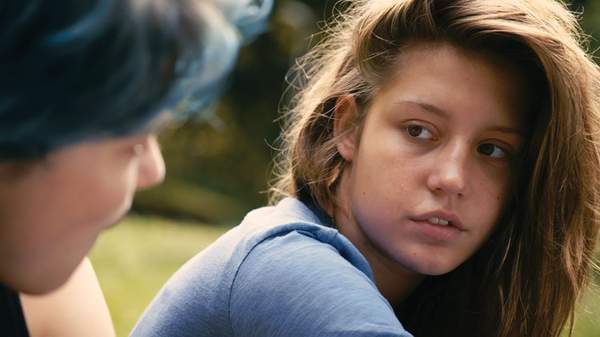Overview
There's the naturalism you know, and then there's the immersive, mythic, sensorial and heady naturalism of Abdellatif Kechiche's Blue Is the Warmest Colour (known in its native France as Adele: Chapters 1 & 2). The director boldly sticks his camera in the face of actor Adele Exarchopoulos and lets it linger there for three hours, watching intensely as the ingenue lives and loses her first love, while several years roll by. It's an extreme viewing experience that garnered high praise in Europe and won the most prestigious independent film award on the planet, the Palme d'Or.
Yet as much as a Cannes-adored French coming-of-age movie (based on a graphic novel, by author Julia Maroh) appeals to my personal proclivities, I found Blue Is the Warmest Colour to be more of an interesting film than a great one. By far its biggest charm lies in the understated yet giving and uninhibited performances of its leads, Exarchopoulos as Adele and Lea Seydoux as her worldlier girlfriend, Emma.
We see Adele as a whole person discovering the world, not just her sexuality. She waxes lyrical about her favourite classic novel, joins in song at a political demonstration, fools around with a sweet boy who only makes her depressed, and eats spag bol with her mouth open at an incommunicative family dinner table. She's from a plain, working-class household, and her world opens up when she meets art student Emma, who floors her from across the street with her blue-streaked hair and white-hot insouciance.
Their love is explosive, total and immensely physical. But first loves don't often last, and that's probably a good thing. Captured in extreme close-up, Blue Is the Warmest Colour lets you feel the beauty and the pain of it, really feel it, for a few blessed minutes.
However, not all of the three hours' worth of scenes deserve to be there, and Kechiche's execution seems haphazard and uncompromising. Since Cannes, there's been growing criticism of the hetero director's imaginings of a lesbian romance, and the camera's gaze does seem to cross a line from luscious into lascivious at times.
Eschewing the usual press tour conventions, Exarchopoulos and Seydoux have been pretty frank in interviews about what it was like to work with the director — "horrible", uncomfortable, possibly exploitative and endlessly drawn out past schedule. It especially matters as the movie includes a hardcore seven-minute sex scene that took apparently ten days to shoot. The actors say they're happy with the results, but it doesn't seem like a methodology we should accept.
Fortunately, Blue Is the Warmest Colour's Palme d'Or, for the first time in history, was jointly awarded to the director and the film's two stars. They're only the second and third women to have won, so hopefully it's a case of one step backward, more steps forward for women in the film industry.
